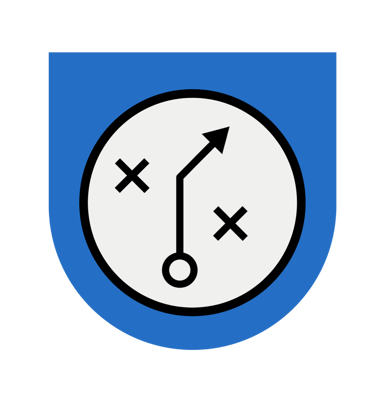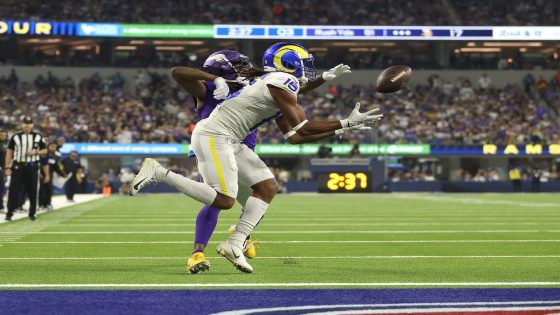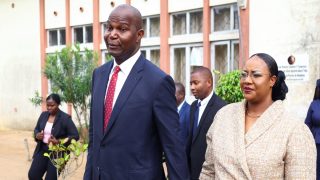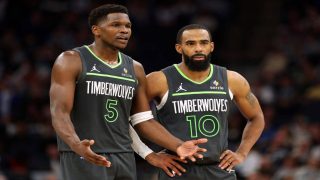Before I began covering the Minnesota Vikings in the fall of 2022, I read countless stories written in the preceding months. One of them, composed before that spring’s NFL Draft, resonated with me.
Chad Graff, who chronicled the team in this space for years, ranked the Vikings’ positions of need. He began at cornerback, followed up with the defensive line, then moved to the offensive line.
He referred to that spring’s cornerback signings as “putting a Band-Aid over the biggest weakness on the roster.” He questioned the ability of the team’s defensive tackles on passing downs. He zeroed in on two positions causing offensive-line issues: center and right guard.
That story reverberated in my mind during Thursday night’s loss to the Los Angeles Rams. The Vikings defense allowed 13.3 yards per play when its cornerbacks played man coverage. The defensive line contributed to a measly 23.5 percent pressure rate. The interior of the offensive line continued its inconsistent performance in both pass protection and run blocking.
Hoecht really hit ’em with the LA hands. 🤪
📺: @NFLonPrime | #RamsHouse pic.twitter.com/krtgKOWP9L
— Los Angeles Rams (@RamsNFL) October 25, 2024
The game solidified what has become clearer by the week: More than two and a half years later, these three position groups — cornerback, defensive line and interior offensive line — remain the three most obvious holes on the Vikings’ roster. So how have multiple free-agency and draft cycles passed without major upgrades at these spots? And what can the Vikings do to finally plug these leaks?
Answering the first question does not require much of a history lesson. General manager Kwesi Adofo-Mensah used four picks in the 2022 draft on these three position groups. They selected cornerback Andrew Booth Jr. in the second round, right guard Ed Ingram in the second, cornerback Akayleb Evans in the fourth and defensive tackle Esezi Otomewo in the fifth. Only two of those players remain: Evans has been relegated to a special teams role, and though Ingram remains a starter, his struggles are well-documented.
The following year, Minnesota went after another cornerback in Mekhi Blackmon in the third round and snagged fifth-round defensive tackle Jaquelin Roy. Blackmon showed promise as a rookie, displaying recognition skills neither Booth nor Evans had. A torn ACL in training camp sidelined him this season. Meanwhile, just as they had the year before with Otomewo, the Vikings cut Roy before this season.
Again this spring, the Vikings returned to the well. They drafted cornerback Khyree Jackson in the fourth round, got interior offensive lineman Michael Jurgens in the seventh and landed interior defensive lineman Levi Drake Rodriguez later in the seventh. Jackson’s tragic passing devastated the staff, who believed he could help them this season. Jurgens and Rodriguez have spent the first half of their rookie seasons in quasi-redshirt situations.
The mere process of going through these names spells out why the Vikings have been so inconsistent. Some context is necessary, though.
Former Vikings general manager Rick Spielman did not help this current regime in terms of the talent and depth at these positions. For example, here is a list of cornerbacks he drafted between 2012 and 2021:
|
Player
|
Year
|
Round
|
|---|---|---|
 Josh Robinson Josh Robinson |
2012
|
3rd
|
 Xavier Rhodes Xavier Rhodes |
2013
|
1st
|
|
2014
|
6th
|
|
|
2014
|
7th
|
|
 Trae Waynes Trae Waynes |
2015
|
1st
|
 Mackensie Alexander Mackensie Alexander |
2016
|
2nd
|
|
2017
|
7th
|
|
 Mike Hughes Mike Hughes |
2018
|
1st
|
 Kris Boyd Kris Boyd |
2019
|
7th
|
 Jeff Gladney Jeff Gladney |
2020
|
1st
|
|
2020
|
3rd
|
|
 Harrison Hand Harrison Hand |
2020
|
5th
|
|
2021
|
4th
|
Since Adofo-Mensah took over early in 2022, the Vikings selected seven of nine players at these three key positions in the third round or later. Pro Football Focus has researched hit rates for specific positions in certain rounds, and to use cornerback as an example, the probability that an NFL team will find a starting-caliber cornerback in the third round is 27 percent.
More picks mean more chances for that probability to fall in your favor, but it’s far from foolproof. That’s where salary-cap space comes into play, and that touches on another facet of the Vikings’ inability to turn the tide at these spots. By paying quarterback Kirk Cousins what the franchise did for multiple years, the team has not had a stockpile of cash to toss at free agents. Instead, the Vikings have mostly operated on the margins, plucking free-agent cornerbacks like Chandon Sullivan (2022), Byron Murphy Jr. (2023) and Shaq Griffin (2024).
We'll take that one!@byronmurphy
📺: @NFLonPrime pic.twitter.com/iKogMRW3zk
— Minnesota Vikings (@Vikings) October 25, 2024
To use an analogy, the Vikings’ tax bracket will change drastically this upcoming offseason. This brings us to how Minnesota can escape the substandard production in these areas.
Because the Vikings have rid themselves of aging veterans and already absorbed all of their dead cap hits — and because young quarterback J.J. McCarthy is on his rookie contract — they’ll have money to spend. As of Sunday, Over The Cap projects the Vikings to have about $75 million to spend on free agents in 2025. That figure factors in the extensions of Justin Jefferson, Christian Darrisaw and T.J. Hockenson and provides Minnesota’s decision-makers with a clear roadmap for how they can use their resources.
Next week’s trade deadline presents an intriguing opportunity as well. Similar to 2022, when the Vikings acquired Hockenson from the Lions (so they wouldn’t have to vie for him — or another tight end — in free agency), they could part with some picks to secure a preferred target. Rather than compete for a cornerback like the Jets’ D.J. Reed in free agency, Minnesota could deal a late-round pick for him now and extend him the way they did with Hockenson.
The same strategy could make sense for Bengals defensive tackle B.J. Hill or Panthers offensive lineman Brady Christensen. Some other options are Cowboys defensive tackle Osa Odighizuwa, Colts guard Will Fries and Raiders cornerback Nate Hobbs. All are free agents-to-be on sputtering teams that might see draft picks as more valuable for the long term.
At worst, exploring these possibilities will prepare the Vikings for free agency the way studying players like Jonathan Greenard and Blake Cashman did last year. That way, they’ll be prepared regardless of what’s likely to be another free-agent flurry. That’s far down the road for a 5-2 Vikings team entering a winnable stretch of games against a trio of AFC South teams (Colts, Jaguars and Titans) navigating their own roster concerns.
But it’s also relevant considering the still-poor state of these positions that have needed fixing for so long.

Free, daily NFL updates direct to your inbox.
Free, daily NFL updates direct to your inbox.
Sign Up
(Photo of Vikings cornerback Shaq Griffin guarding Rams receiver Demarcus Robinson: Katelyn Mulcahy / Getty Images)





